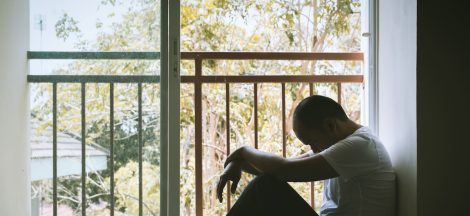Despite the disability, prosecutors argued that prison was necessary to send a message, describing the bail jump as one of the most egregious of its kind.
Justice Michele Wilkinson-Smith wasn’t so sure it ranked that high. But she eventually agreed that Burns’ crimes necessitated a custodial sentence – in part because of the defendant’s stubborn refusal to engage in an interview that might have revealed sentence reduction opportunities.
The judge ordered a term of two years and nine months.
“I suspect you simply distrust the system, but it is a shame you wouldn’t talk,” the judge said. “If you had talked, I would have listened.”

Justice Wilkinson-Smith added that without the interview, it was hard to know how Burns felt about what had occurred on the November 2021 afternoon when 22-year-old Rangiwhero Toia Ngaronoa was stabbed to death by the defendant’s daughter.
He had been held captive and targeted for a beating because he had suggested someone in the women’s family had engaged in sexually inappropriate behaviour with a toddler. No one, including the toddler‘s mother, thought the accusation was credible.
Burns may still think her involvement in the retribution plan, before it went off the rails with her daughter’s frenzied stab attack, was justified, the judge speculated.
“But real harm resulted. I hope you reflect on that,” she said. “Your daughter has been removed from her children.
“Getting involved in vigilante justice is not worth it.”
‘Gangstress’ attack
Burns faced up to five years’ imprisonment after having pleaded guilty in February to charges of failure to answer bail and conspiracy to injure with intent.
The admissions of guilt came days before she was set to stand trial alone, her daughter and son-in-law having been found guilty of murder and conspiracy to injure during a jury trial over a year earlier.
Her former partner, Rocky Ngapera, and his brother, Thomas Ngapera, had also been charged with conspiracy to injure but pleaded guilty in 2023 just before Burns-Wong-Tung’s murder trial.

According to the agreed facts for Burns and the Ngapera brothers, all three entered an agreement along with Burns-Wong-Tung and her partner, Tago Hemopo, to take the victim to Burns-Wong-Tung for a hiding. They met in the middle of a residential cul-de-sac in Clendon, South Auckland.
CCTV from the neighbourhood showed Burns-Wong-Tung and Hemopo arriving first in a Honda Accord, with Burns arriving five minutes later in a separate vehicle after receiving a text from her daughter. A Ford Escape with the Ngapera brothers and the victim – their nephew – was the final vehicle to arrive at the meet-up, one minute after Burns.
The Ngapera brothers got out of the SUV, leaving Ngaronoa in the back seat, and Burns-Wong-Tung approached with a concealed knife.
Two bystanders described hearing shrieks and screams coming from the SUV – one of them recalling that Burns-Wong-Tung’s fists were moving like “pistons” during the attack.

“Thanks, bruv,” she allegedly told Thomas Ngapera as she walked away from their now bloody SUV and drove away from the scene.
Burns-Wong-Tung denied having used anything other than her fists during the attack, with her lawyer suggesting the stab wounds might have been inflicted later on by the Ngapera brothers. But jurors didn’t find that explanation credible and in December 2023 she was handed a life sentence with a minimum non-parole period of 15 years.
Justice Matthew Muir, who oversaw Burns-Wong-Tung’s sentencing, denounced her prolonged, brutal attack but decided a 17-year minimum period would be “manifestly unjust” when considering her transient childhood, which involved sleeping at gang pads and, after both parents were incarcerated, on the streets.
“You behaved like the gangstress you were largely conditioned to become,” he said.
During Burns’ recent hearing, Justice Wilkinson-Smith said it was never alleged the mother knew her daughter would use a knife
“I accept, Ms Burns, that was not your intention,” the judge said of Ngaronoa’s death. “But it came about as a result of your conspiracy to be part of this.”
History of offending
The Crown’s proposal for Burns’ sentence starting point didn’t vary much from the defence because of the principle of parity. The judge who sentenced the Ngaronoa brothers for the same conspiracy charge two years earlier settled on a starting point of two years and nine months before factoring aggravating and mitigating features, and lawyers on both sides agreed Burns’ situation was largely similar.
But defence lawyer Jennifer Philson did disagree with how much Burns’ sentence should be increased for her long disappearance. Burns’ 18 months of freedom came to an end only when police found her by accident while executing an unrelated search warrant last May.

While Burns did miss the initial trial, her guilty plea saved the court from having to go through the process again, Philson said.
The defence lawyer acknowledged it would be hard for the judge to assess remorse when her client hadn’t completed a pre-sentencing interview in which such a topic would have been discussed. But she suggested it was Burns’ hip pain, not a reluctance to co-operate, that resulted in two scheduled interviews being thwarted.
Burns also hadn’t offered a letter of apology to the court – a basic step utilised by the majority of defendants up for sentencing. But her lawyer said she had volunteered to engage in restorative justice with the victim’s family. It never happened, the court was told, only because family members could not be found.
“That shows she was willing to face up to her wrongs and offer an apology in person,” Philson said.

Crown prosecutor Katie Karpik pointed out that Burns was seen on camera to be about a metre from her daughter as the multiple stab wounds were inflicted and she didn’t intervene. As the Ngapera brothers left the scene to rush their nephew to a medical clinic, Burns instead followed her daughter’s car, the prosecutor also noted.
Karpik described Burns as, in a way, the glue that allowed the violent conspiracy to coalesce because of her connections to the various parties.
Justice Wilkinson-Smith settled on a starting point of two years and six months for the conspiracy charge – three months shorter than the period assigned to the Ngapera brothers, she said, because the brothers brought the victim to the scene and “had the power to stop it happening”.
She then ordered a six-month uplift for Burns’ failure to answer bail charge, which carries a maximum sentence of one year’s imprisonment. It would have been a more egregious case, she said, if Burns had used her time on the run to commit new crimes or to threaten witnesses. But the fact she took advantage of compassionate bail is significant, the judge said.

“It makes it harder for others to get compassionate bail,” the judge said.
A further one-month uplift was added for Burns’ 26 previous convictions, which had resulted in 12 previous prison sentences. They included two violent assaults in the 1990s and nine prior failure to answer bail charges from 2006 to 2019.
The judge declined sentence reductions for remorse or the short time Burns spent on electronically monitored bail, but she allowed 10% in total discounts for her late guilty plea and for the extra burden prison will be on a person in a wheelchair.
“I wish you well for the future, Ms Burns,” she said.
‘Royalty’
Burns and her daughter are members of one of Auckland’s most prominent Mongrel Mob-affiliated families.
Burns was the long-time partner of Willy Wong-Tung, known as King Willy Dog, who died in 2017. He and other family members were senior members of South Auckland’s Mongrel Mob Notorious chapter and Wong-Tung at one point served as president.

Unofficially, and outside earshot of jurors, the family was sometimes referred to as Mongrel Mob royalty.
Supporters with prominent gang tattoos and outfits consistently accented with red attended every day of Burns-Wong-Tung’s trial. But the scene was much different during Burns’ two recent court appearances, with the gallery empty as she pleaded guilty and was sentenced.
That was by design, Burns said last week while calling out to a reporter as security officers rolled her out of the dock to begin serving her sentence.

“Don’t write dumb stuff,” she said. “You said I don’t have no whānau support. I have.
“I don’t want them here.”
Craig Kapitan is an Auckland-based journalist covering courts and justice. He joined the Herald in 2021 and has reported on courts since 2002 in three newsrooms in the US and New Zealand.
Sign up to The Daily H, a free newsletter curated by our editors and delivered straight to your inbox every weekday.




 Auckland measles case: Ferry, supermarket exposure alert
Auckland measles case: Ferry, supermarket exposure alert